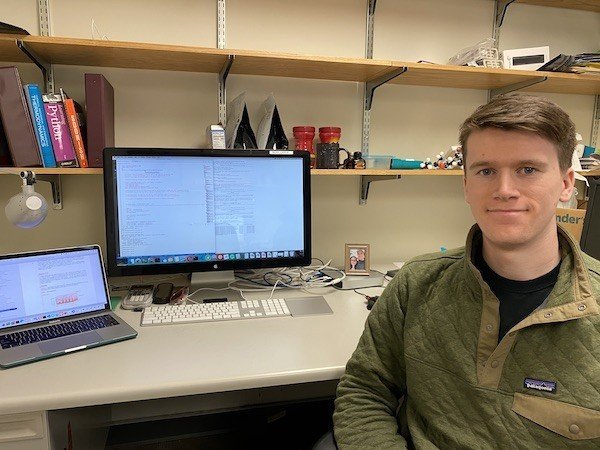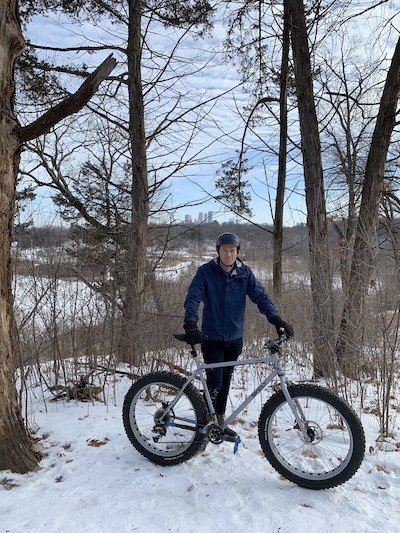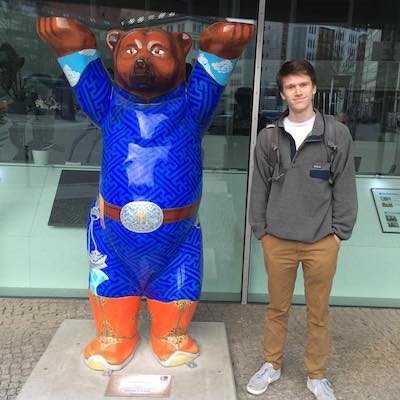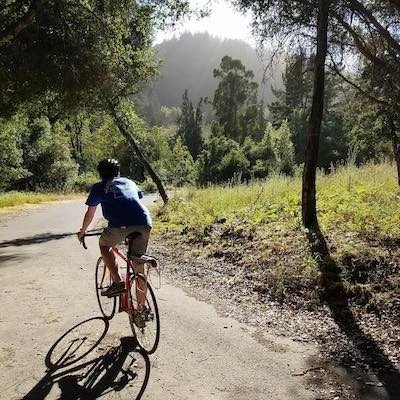Meet CTC: Iain Schmitt

February 10, 2020 -- Born and raised in Atlanta, Georgia, Iain Schmitt is a fourth-year honors undergraduate student majoring in chemical engineering and minoring in chemistry. Within CTC, he works as a research assistant in the Siepmann group.
Iain’s main project is modeling the separation of ethanol from a biofuel fermentation broth through a technique called liquid-liquid extraction. The energy industry is looking for alternatives to petroleum that are more sustainable and produce fewer greenhouse gas emissions - ethanol fits these criteria. Since it is produced from biomass, such as plants, it is renewable. It also burns cleaner than petroleum, reducing the amount of air pollution.
Traditionally, ethanol has been separated from the fermentation broth using the process of distillation; however, this process is energetically costly because the solution must be heated in order for separation to occur. Liquid-liquid extraction does not require heating, and instead uses an extracting solution to separate ethanol from water. Iain is trying to find a solvent that is selective for ethanol, but not water, despite their dipole moments and hydrogen bonding capabilities being quite similar. Once a solvent is found, this process could be used in commercial settings, and ethanol could become more widely used.
To model this process, Iain uses the Monte Carlo for Complex Chemical Systems‒Minnesota (MCCCS-MN) software, an in-house Siepmann group Monte Carlo molecular simulation program. To run consecutive simulations, he uses Bash scripts at the Minnesota Supercomputer Institute. He then uses Python to process the outputs from his simulations into conclusive data.

In his free time, Iain enjoys cycling, photography, and rock climbing. One of his favorite memories in his undergraduate career so far was a bicycle trip from San Francisco to Los Angeles in the summer after his freshman year. As a year-round cyclist, he appreciates the dense network of bike lanes and trails across the Twin Cities metro area. He is also actively involved in the Beta Theta Pi fraternity, who he credits for getting him involved in scientific research.
Why did you choose the University of Minnesota, and what led you to join the Siepmann Group?
I was accepted to both Georgia Tech and the University of Minnesota. While Georgia Tech is an excellent institution, my home neighborhood in Atlanta was only a few miles away. On top of this, I was fortunate enough to receive in-state tuition to Minnesota through a scholarship program, and I really enjoyed my campus visit. After living in Atlanta for 18 years, I was ready for a change of pace, and cooler weather, which made Minnesota the right choice for me.
I joined the Siepmann group in my second year while finishing up the introductory physical chemistry class with Professor Gao, who is another CTC faculty. I was fascinated by statistical mechanics and watched a couple of Professor Cramer’s flipped classroom lectures for the introductory computational chemistry class. I then emailed Professor Cramer explaining my interests in computational chemistry and research more generally. He recommended I reach out to one of the faculty members in the CTC and, around the same time, Professor Siepmann had an opening for an undergraduate research assistant.
How did you become interested in studying chemistry, and what gets you the most excited about your field?
I had a really good IB chemistry teacher back in high school. Mr. Locke held us to high standards and made the material exceptionally engaging. When I was considering what direction I wanted to take at/near the end of high school, I found chemical engineering a great middle-ground between math, physics, and chemistry. What gets me excited about theoretical chemistry is how you can prove so much using only three basic assumptions.

What do you enjoy most about your research?
What I enjoy about computational chemistry research is how much more you can get done with every incremental improvement in your scientific computing skillset. While the learning curve for computational chemistry can be steep, doing something as simple as running consecutive simulations when I first started out in the lab was really rewarding after spending an hour or two troubleshooting a Bash script.
What’s the best piece of advice you’ve received?
The best research advice that I’ve ever received is to build relationships with the postdocs and graduate students in your lab, and talk to them about the day-to-day challenges in your research project. Computational chemistry can be, at times, somewhat solitary. If you don’t reach out to more experienced people in your lab, you might waste weeks on a common problem that they’ve already crafted a solution for.
What are you most proud of about your academic career so far, and what’s one thing you’d like to achieve in the future?
I am proud that I continued progress on my research while working as a co-op chemical engineer in training last year in Appleton, Wisconsin. On top of working full-time, I worked remotely on my project for about 8 hours per week. Balancing work and research while learning how to work remotely was a challenge; however, I think that I’m a better engineer and researcher because of it. My main goal is to continue making progress on the ethanol extraction progress until I have simulation results relevant enough to write a journal publication.

What are your plans for after graduation? How will your involvement in the Siepmann group help you achieve this goal?
Right after graduation, I want to spend a few months “bikepacking” along the U.S. coastline. After that, I still haven’t completely made up my mind. I want to continue programming, but am considering both applying to graduate school and going straight into industry. I have found my time in the Siepmann lab rewarding, but I realize that a Ph.D. program is a substantial commitment that requires thorough consideration.
Whether or not I choose to continue into graduate school, I will make use of what I’ve learned from the Siepmann laboratory: planning and carrying out a research project, asking the right questions when a piece of software isn’t working as intended, and strong attention to detail.
